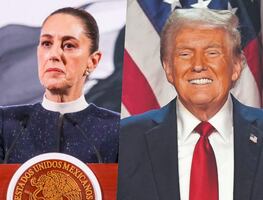Más Información

Sergio Gutiérrez Luna destaca aprobación de 25 reformas en la 66 Legislatura; "Un logro histórico para la 4T", señala

Secretario de Agricultura reafirma defensa del maíz blanco; "Seguiremos apoyando la producción nacional no transgénica", afirma

¿Maíz transgénero? Rubén Rocha corrige desliz durante discurso en Sinaloa; destaca importancia del maíz blanco

Sheinbaum asegura apoyo total a Sinaloa para enfrentar violencia; "Nunca los vamos a dejar solos, aquí está la presidenta"

Dictan 600 años de prisión a "El Negro" Radilla y "El Cone"; responsables de secuestrar al hijo de Javier Sicilia

Familias de desaparecidos en Mazatlán irrumpen en evento de Sheinbaum; mandataria promete atender peticiones
The early election held on Thursday, June 8 in the United Kingdom, in which the conservative government of Theresa May put all its hopes, was a bold political calculation that ended up being an expression of enormous fragility and testimony of the influence that unexpected events can have on the calculation of leaders under scenarios of extreme political variability . In any case, the expectation that this electoral process would give the UK a strong and legitimate leadership to deal with the complex negotiation process deriving from Brexit is now shattered.
For understandable reasons, the two central contenders of the elections adopted the flag of fight against extremism and contrary to what might have been expected, the strong discursive response of May's government to the last terror incident did not promote the public's opinion in its favor, but quite the opposite.
The security of a global power such as the UK can not be understood only in terms of its internal dilemmas , especially since many of them are a mirror of the position it occupies in the international arena .
The UK will face a number of challenges running parallel to the decision of abandoning the EU. Among them is the need to strengthen defense spending, reinforcement of its participation in the various initiatives of the North Atlantic Treaty Organization (NATO), and the increasingly costly claim to maintain a credible nuclear deterrent capability . The three great political forces of the country spoke in one way or another on these issues during the campaign.
Theresa May insisted that Brexit, in its hard version, would offer the UK a new opportunity to claim its place in the world as an international power . It is a statement that before the election day was already doubtful. Less than ten days before the formal start of that process, the UK arrives at the negotiating table with a fragile coalition government and a weak political leadership to which Europe does not seem to be willing to grant concessions.
Theresa May believed that she had correctly interpreted what had happened in her country over the past year, assuming she could navigate upstream in the face of that storm. Sooner or later, those who succeed in the leadership of that great nation will have to assume responsibly the challenge posed by the practice of strategy , that central tool of political endeavor that Sir Lawrence Freedman defined as the art of creating power even under the most adverse conditions.
Analyst in international security by The Fletcher School of Law and Diplomacy
@alexis_herreram
mr




